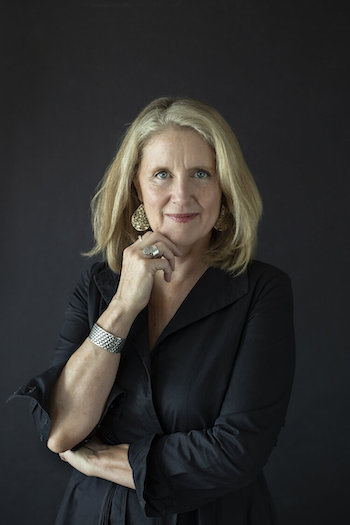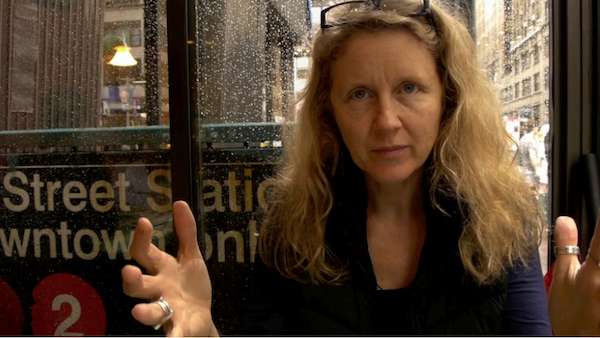Arts Remembrance: Lucia Small, 1963-2022
By Peter Keough
This is a profound loss to cinema and to Boston’s filmmaking community in particular, a close-knit group in which Lucia Small enjoyed many friendships and engaged in fruitful collaborations.

The late filmmaker Lucia Small. Photo: Gulnara Niaz
Lucia Small, whose powerful, intimate documentaries My Father, The Genius (2002), The Axe in the Attic (2007) One Cut, One Life (2014), and Girl Talk (2022) examined tragedy and resilience with clarity, compassion, and humor, died November 19. She was 59, a victim of pancreatic cancer. It is a profound loss to cinema and to the local filmmaking community in particular, a close-knit group in which Small enjoyed many friendships and engaged in fruitful collaborations.
Small began her media career in public radio, demonstrating her dedication to environmental issues by launching and developing the news magazine program Living on Earth (1992-1994), the first such series on NPR. After discovering film she produced several award-winning projects for ITVS, PBS, and American Public Television, including Beth Harrington’s The Blinking Madonna and Other Miracles (1995), Laurel Chiten’s The Jew in the Lotus (1997), and Katrina Brown’s Traces of the Trade (2008).
But with her feature directorial debut My Father, The Genius (2002) Small masterfully established her distinctive style and voice and showed her insights into the interconnection between the personal and profound, the absurd and the serious.
Glen Small, the patriarch of the title, informed Lucia, his daughter, that he had included her in his will and requested that she write his biography. Instead Small agreed to make a film about his life, though she had misgivings. On the one hand, her father was a renowned architect (his designs look as revolutionary and visionary as those of, say, Buckminster Fuller) who had dedicated his career to bettering the human condition, to “saving the world through architecture.” But on the other hand he was a bust as a husband, a womanizer, and a negligent father. And though by 31 he was on the verge of greatness, by 61 he was edging toward professional and financial ruin. His self-professed genius had brought him down because of his ego-driven feuds with better-established architects.
Is Glen Small worthy of a film?
Lucia Small proved up to the challenge. She negotiated her father’s conflicted life through a combination of empathy, shrewd observation, irony, and compassion. In its balance of absurdity, gravity, and humanity the film resembles a nonfiction version of Wes Anderson’s The Royal Tenenbaums (2001).
For her next two projects Small teamed up with Ed Pincus, a veteran documentarian famous, while teaching at MIT, for pioneering the personal nonfiction genre with his candid Diaries 1971-1976 (1982). Theirs would be the most fruitful and consequential of Small’s many collaborations with local filmmakers.
In The Axe in the Attic (2007), their first film together, they were moved by the devastation of Hurricane Katrina in 2005 and drove from New England to New Orleans, cameras in hand, to personally observe the storm’s aftermath. They bickered often en route but soon the magnitude of the disaster, the ineptitude of the government response, and the inequities of race and class that have been exposed, overwhelmed petty concerns. What they witnessed called into question the ethics of making a movie about tragedies suffered by others; and the two confronted this moral dilemma in much the same way that James Agee did in his book about impoverished Southern sharecroppers, Let Us Now Praise Famous Men (1941). As in all her films, Small demonstrated an eye for the telling, often devastating detail — the title, for example, refers to the axes that residents of New Orleans, guided by prior storm experience, have stashed in their attics to chop a hole in the roof to escape rising flood waters.

Filmmaker Lucia Small in a scene from One Cut, One Life. Photo: Ed Pincus
For their second film One Cut, One Life (2014) the tragedy is not observed or theoretical. It is personal. Small had just lost two close friends in shocking, violent circumstances — including the filmmaker Karen Schmeer, the editor of My Father, The Genius. Now she learns that Pincus himself is stricken with terminal leukemia. So the two decide to work together to record his last days. It is an unflinching confrontation with mortality, grief, and loss.
Expressing doubt about the process is Pincus’s wife, Jane. As Small recalled when I interviewed her about the film for the Boston Globe, Jane Pincus felt making the film did not bring them closer to the experience but alienated them from it. “She wants to live life, not examine it,” said Small. “At least not while it’s happening. She has legitimate questions about the ethics of what we’re doing. Whether as filmmakers we are finding the truth or are creating it.” This reservation aside, the power of some scenes is unforgettable, and in its messy eloquence and pathos the film is reminiscent of Lightning Over Water (1980), Wim Wenders’s similar documentary about the last days of the director Nicholas Ray.
After the sometimes overwhelming emotions and heavy mood of One Cut, One Life, Small’s last film, the slyly titled, deceptively subtle Girl Talk exhilarates with the liveliness and exuberance of its young subjects, five female members of the Newton South Debate Team. They are driven, brilliant, occasionally self-questioning, often merciless, and capable of rapid fire arguments so swift they are incomprehensible. But given the prejudices of the mostly male judges, they have less of a chance of winning (40 percent of high school debaters are girls, but only 10 percent win) than the boys in competition. Because they are female, their voices go unheeded.
But in the rarefied confines of high school debate the system is changing. So are the attitudes of the female debaters, whom Small followed over the course of five years. They are growing confident and are winning. But what of the world outside? The film notes some former high school debaters that have made good in their fields, such as Oprah Winfrey, Sonia Sotomayor, and Hillary Clinton. Unstated but unavoidable is the question of how women fare in the similarly male-dominated world of filmmaking, where for 25 years Small persevered to make brilliant documentaries but has yet to receive proper recognition.
As film critic Gerald Peary told me, “A very good case could be made for Lucia being the most important documentarian in New England in the last 20 years, certainly challenging the province of Frederick Wiseman, Errol Morris, and other male filmmakers. All four of her feature documentaries hit the bullseye.”

A scene from Lucia Small’s film Girl Talk.
As demonstrated in Girl Talk, one area in which girls and women invariably beat the boys is teamwork. Working with other filmmakers on their projects has been a hallmark of Small’s career. The films she has contributed to include Amy Geller and Gerald Peary’s The Rabbi Goes West (2019), Fiona Turner’s Eat Up (2018), Brittany Huckabee’s After Fire (2016), Gerald Peary’s Archie’s Betty (2015), and Lyda Kuth’s Love and Other Anxieties (2010).
This doesn’t include all the friends she has made and supported over the years. As Peary puts it in his Facebook tribute, “Friends? Nobody had so many people whom she cared about and who loved her in return. An amazing amount of friends!”
Peter Keough writes about film and other topics and has contributed to numerous publications. He had been the film editor of the Boston Phoenix from 1989 to its demise in 2013 and has edited three books on film, most recently For Kids of All Ages: The National Society of Film Critics on Children’s Movies (Rowman & Littlefield, 2019).

Wonderful tribute. She was inspiring throughout the career you describe so well and beyond. She was discussing Girl Talk at festivals throughout this last year while remaining open about her condition with an honesty that was remarkable and without self-pity, or even a mention at times. I remember being wowed by her first film years before being introduced to her. What a gift to have known her.
Thanks Tim. Such a loss.
Peter, your tribute is full of grace, insight and true respect. Thank you! Hearing memories of lifelong friends and caretakers in recent weeks has been humbling– I barely knew her, despite two decades. A friend of 40 years said that Lucia told her she’d been living this year in Technicolor, loving even mundane moments, her eyes shining, determined to finish her Girl Talk California tour. As a childhood friend said, Lucia lived fully to the last minute, always with others in mind, laughing and giving, yet clear on her own purpose. She left us heartfelt gifts and unfinished conversations.
Thanks for writing about Lucia Small, Peter.
thanks
thanks jon
Thanks for this beautiful tribute.
She set a good example.
thanks
Beautiful tribute. Her film about her father deeply touched me.
thank you
A stunning, inspired tribute. I only “knew” Lucia from Girl Talk. I want to see every film.
I’m glad she knew and made such love.
Peter, thank you.
I’m not in quite an articulate place at the moment, about Lucia’s passing.
Even though we’ve all known for awhile about the severity of her cancer, it’s shocking to take in the idea of Lucia not being with us.
But this is why I am so glad YOU have put the words together properly.
And that you’ve put Lucia in league with Wenders, Agee, Anderson.
A Listers. Where she belongs.
The loss to our community is incalculable.
Thank you again
MJ
Thank you for this tribute to Lucia, Peter and ArtsFuse! She definitely made a big impact on this Boston doc community over all the years. RIP Lucia.
I had the honor of working with Lucia when she was involved in the production of DAMRELL’S FIRE (2006). Her calm confidence & guidance was impressive & helped mold the historical documentary. Her last film GIRL TALK depicted the critical importance of girls and women finding their voice to realize their dreams. My condolences to all those who were touched by Lucia’s light.
Beautiful tribute, Peter. Such a profound loss of a wonderful soul and immense talent, which you captured so eloquently. She touched so many lives exponentially. She left a deep void but also an incredible legacy.
Thank you all for your comments. It was a privilege to write this.
I met Lucia at the Slamdance Film Festival-
I had a picture playing in the Festival- Orwell Rolls In His Grave, and was immediately impressed with her.i just looked her up almost 20 years later so this speaks for itself- sorry to read she died.
Peter, thanks so much for writing this perceptive and warm piece. Lucia was one of a kind.
I’ve always loved My Father, The Genius. What a kick-ass film!
Lucia’s spirit and perseverance were and are inspiring. Making independent docs is a super-tough business where there’s never enough funding, help, PR, engagement, or outreach, and she hung in there for decades. True Grit.
I think I’m one of those many people she cared about and who loved her in return – and were far from the center of her artistic life. She was just a girl I met at the park walking her dog who, after I got to know her mentioned that she made films. The last time we spoke she had just returned from a “trip of a lifetime” and the last time we texted she was still riding the high from “the best day of her life” (premiere of “Girl Talk.”
I met Lucia via Beth Harrington on The Blinking Madonna film. Lucia was bright, brilliant, a light-like her name. Intense, with clear intent. So happy to see this tribute. Rest softly Lucia.
I only recently learned of Lucia’s passing from her father who is a friend, occasional visitor and also happens to be the architect of this house, built by him that I have the privilege of living in now on the Oregon coast. A few of my neighbors told me of the film, and I was able to see it several years ago and it was quite revealing not only in his talents as a designer but also his ego and family life. I wish I had known Lucia personally as she embodied truly professional talents and contributed to so many others. I’m sure she will be missed by all her friends and fellow film makers. She was so fortunate to have been a respected member of her film community.